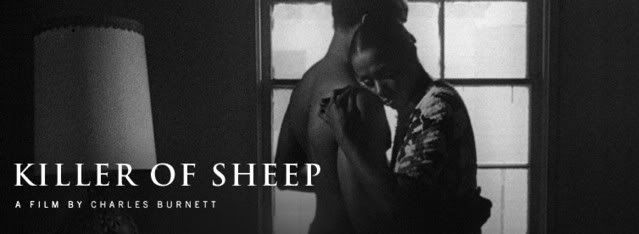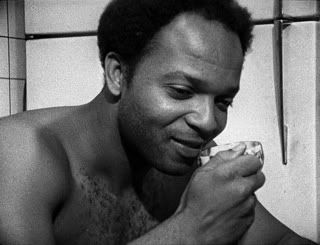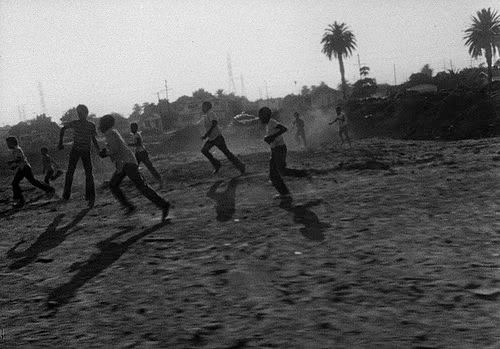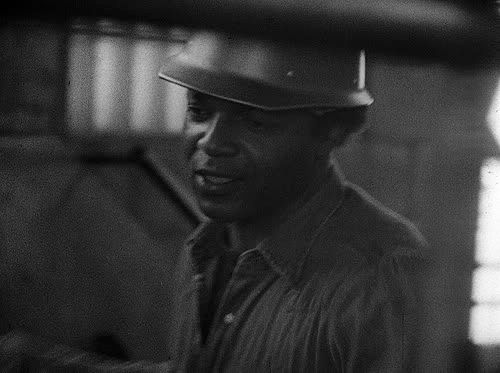
Killer of Sheep is that rare film that eschews plot and story lines for human experience. The movie opens in the past with a reprimand to young Stan, and to us as well. We join Stan in the present, his wife and children in the seedy Watts section of Los Angeles. We will live with them for only eighty-three minutes, but in this short time, director Charles Burnett will present us with life in all its flawed beauty. What we learn is up to us.
The origins of KOS are well known. While studying at UCLA, Burnett began making ample use of the universities film lab and equipment. Dismayed by Blaxploitation film, which dealt with stereotypes (most of them criminal), Burnett drew inspiration from Neorealism and the work of Vittorio De Sica whose work explored the lives and emotions of the everyday man. Non-actors fill most of these roles in true De Sica fashion. Burnett had originally envisioned a three film series about Stan and his wife, but limited funds and equipment use (UCLA wanted their lab back) has only left us with a small portion of Burnett’s epic.

Raising a family in deteriorating Watts, Sam is a man of much mileage who has long since run down. Despairing of personal hopes and dreams, he works at a nearby slaughterhouse where cool detachment has become his way of life. For Stan to admit his total desperation would be suicide. Instead, he is a sleepwalker doing the things he must to survive. Insulated and isolated, Stan is almost unreachable by those who love him.
Burnett got his start in photography and much of KOS is just that—pictures and music. We are observers of a certain kind of life here and perhaps the most touching thing about this film, is the fact that Burnett trusts us with his vision. We walk around his neighborhood taking in the sights, making up our own minds about what we see. Many of these wordless scenes can be viewed as small vignettes or parables that attempt to explain black life as a whole: A child laying under a train while another playfully steals his shoes, Kids jumping across rooftops heedless of danger, or Stan’s lonely dance with his wife as they are unable to connect physically or emotionally.

If pictures tell stories, Burnett’s choice of music provides context and commentary on his social backdrop. Sheep hanging in the slaughterhouse suggest it is “A Mean old World” (Little Walter) indeed. Paul Robeson’s “That’s America To Me” underscores the harsh reality that the American Dream is only a fantasy for the impoverished. Earth Wind and Fire’s “Reasons” is a record played by Stan’s child who sings along while Stan’s wife puts on makeup, arranges her hair and dress for her man who has long since lost interest. Burnett shows his genius here by cutting between the two rooms, showing us daughter and mother listening to the same song, which has a different meaning for each of them. When Stan’s wife looks in on their child it’s a bittersweet moment. Here is a little girl singing along to an adult-themed song about love. When Stan’s wife appears in the frame we wonder if she is the embodiment of what this child will become. Will her fate be the same as her mother?
Although the movie has its share of bleak moments, if Stan were merely a miserable man, this wouldn’t be much of a film. His refusal to admit his situation (“We ain’t poor! I give stuff to the Salvation Army!”) belies his inability to climb out of it. A man can live without many things, but honor is not one of them. There’s also humor in Stan’s son, who is always in trouble (he likes a little bit of cereal with his sugar and milk), Stan’s adventure buying the used motor, or the gang drinking in the windowless car. There is a tenderness as well. Stan loves his daughter. She is the only thing that can still touch his heart. When he plays with her, you know that beauty and love still exist for him—even in the darkest places of his soul.
Although Killer of Sheep owes much to De Sica and the Neorealist movement, it is fundamentally different in the fact that there is no crisis that changes Stan’s outlook. In Bicycle Thieves (1948) or Umberto D. (1953), crisis creates change. KOS provides no such easy outlets and we are left pondering hard questions with no easy answers. At the end of the film Stan’s circumstances haven’t changed, but he has. His view is not one of acceptance or understanding, but determination.

As Stan drives the sheep to the killing floor, we realize there is no hope for his situation. It's for his children that he does these things now, in hopes they will leap across the void that separates these separate American existences. Is he a defeated man? Perhaps. That’s a question Burnett wisely leaves in our hands, rather than moralizing. Stan might not have the stars to play with nor the moon to run away with, but he has some things money cannot achieve—namely his community and the love of his family.
When new life comes to the neighborhood, it grows at the personal cost and sacrifice of others to sustain and nurture it. We see this in the death of the sheep and perhaps the death of Stan’s hopes and aspirations, which are unfulfilled. Stan does have hope for his children, and this hope has returned him to the human race and drives him on. These things, like the sugar that sweetens his son’s cereal, temper his life and help him to see that perhaps his journey on this earth is not so bitter after all.
